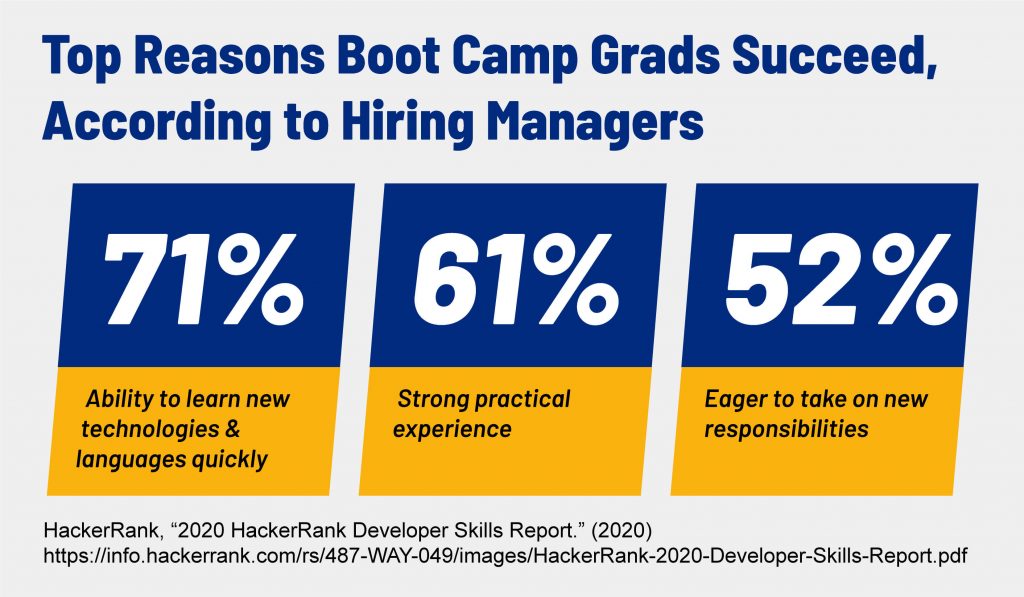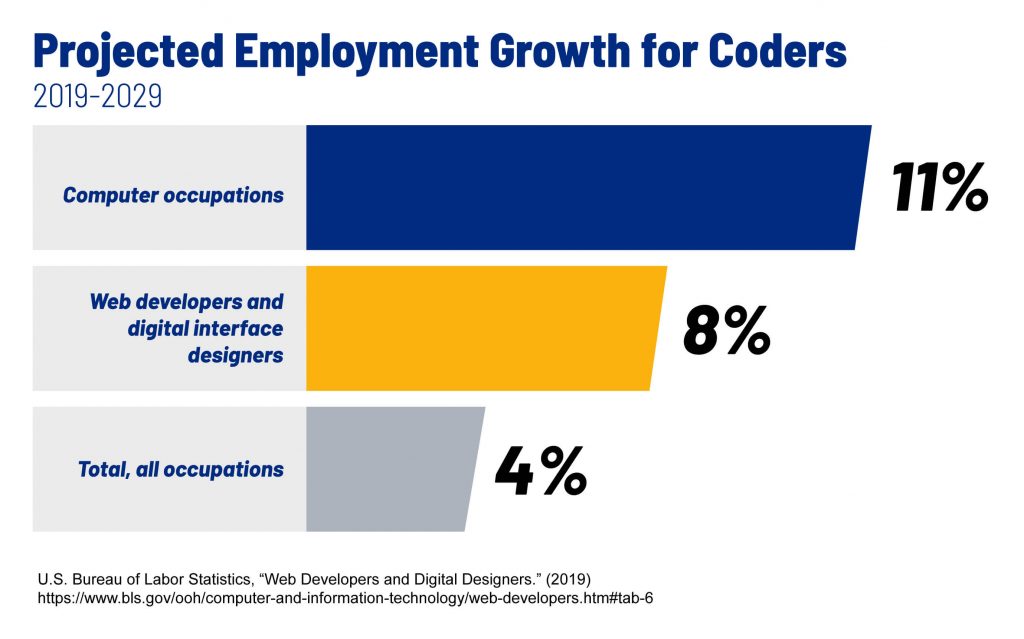How to Become a Coder in 6 Months from Scratch — Without a Degree in Computer Science

Let’s be honest — coding is cool. Programming plays a part in almost every aspect of modern life; coders stand as the architects of our digital worlds, the people who ensure that our online experiences run smoothly.
If you’re thinking about getting into coding, you probably already know this. You probably also know that coders are in high demand across the country and are excited to take the next step.
Still, you may be uncertain about how best to make the career leap if you’ve already attended university, have a job in another field or simply don’t have the time to seek a conventional four-year degree. But don’t worry — you don’t need a degree to become a coder.
In this article, we’ll cover what programmers do, potential career paths and how to become a coder without a degree. We’ll also lay out the steps you can follow to become a coder in 6 months without a degree, including learning at a coding bootcamp, pursuing self-education and taking on your own projects.
Read on to explore your next steps toward a career change into software development!
5 Steps to Becoming a Coder in 6 Months Without a Degree
How long does it take to become a coder? It doesn’t necessitate years of preparation; if you make a proper plan and follow it, the process could take as few as six months.
Ultimately, the specific timeline you choose is up to you — you could make a year-long transition plan or opt for an even shorter, three-month schedule.
Below, we’ve listed a few of the steps you’ll need to follow as you make your transition into a web development or software development career.
1. Explore Online Resources and Learn More
Generally speaking, how you start your career journey will depend on your level of experience and specific interest. Those who already know coding fundamentals may feel comfortable launching into formal classes right away. Hobbyists or beginners, however, may prefer to spend some time exploring a few coding basics online.
One of the first steps you can take when planning your career change is to take advantage of free online coding resources. Countless online sources provide valuable career advice, host opportunities for project-based learning and offer extra insights into computer science’s theoretical underpinnings.
Not sure where to start? You can explore sites like w3schools for free learning resources to help you get a handle on coding basics.
A quick clarification — these resource sites are not designed to facilitate a rapid career change. However, they can provide you with valuable coding lessons and exercises relating to basic languages such as HTML, CSS and JavaScript.
2. Further Your Education With a Coding Bootcamp
If you’re wondering how to become a coder in three to six months and have no coding, web development or software engineering experience, you’ll want to enroll in a coding bootcamp.
Coding bootcamps are intensive programs that help students build foundational knowledge in core technologies. Unlike university computer science programs, bootcamps are designed with a strong emphasis on practical skills and hands-on experience employers are looking for when hiring for open positions.
Skills taught in bootcamps can include but are not limited to:
- HTML
- CSS
- JavaScript
- jQuery
- MySQL
- MongoDB
- Python
- Java
- C#
These programs also offer flexibility; you can attend a virtual online coding bootcamp on either a full-time or a part-time schedule, depending on your other responsibilities and availability. Many coding bootcamps can be completed in three months (full-time) or six months (part-time).
A bootcamp is not a self-study program; even if you attend a bootcamp online, you’ll receive individualized training, education and interaction from your instructors, just as if you were attending an in-person coding bootcamp. As an enrollee, you’ll engage in focused, accountable study, gain proficiency in a wide range of popular coding languages and work on individual and group projects that will eventually serve as the core of your portfolio.
By the bootcamp’s end, you’ll have a level of comfort, familiarity and knowledge of coding that will empower you to hit the ground running from your first day on the job.
Employers know this, too. One of the great things about coding is that the profession is welcoming to talented coders of all ages and career backgrounds. A bootcamp certificate proves that a candidate has marketable skills, works well under a tight timeline and is willing to put their all into assignments.
Data supports this: according to a recent survey from HackerRank (PDF, 2.4MB), 39.2 percent of surveyed hiring managers believe that bootcamp graduates are just as qualified as their conventionally-educated peers, and 33 percent say that bootcamp learners are more qualified.
The same study also found that the majority of hiring managers believe that bootcamp grads excel because they learn new technologies and languages quickly (71 percent), have strong practical experience (61 percent) and are eager to take on new responsibilities (52 percent).

If you want to learn how to become a coder in six months or fewer, you’ll need all of the educational and career benefits that a coding bootcamp provides.
Get Program Info
3. Consider Your Specialty and Focus
As you expand your knowledge about coding, you may want to think about what kind of programmer you’d like to be. If you know how you want to apply your coding skills professionally, you can seek out courses, internships and projects that suit your interests. This isn’t to say that you necessarily need to pick a specialty — if you’re uncertain, a more generalized study path can help you figure out what you want to do in the future.
Generally speaking, programmers can choose one of three career tracks: front end, back end and full stack. Here’s a quick rundown:
- Front End Developers:These professionals focus on the client-side of a website — the part that visitors can see and interact with. Front end programmers primarily focus on designing and building the aesthetics and structure of a site.
- Back End Developers: These coders are responsible for the server-side, or back end, of websites and applications. Their work ensures that the website functions as it is intended to.
- Full Stack Developers: As the name suggests, full stack developers are responsible for the “full stack” of development technology; they have the knowledge and skills necessary to tackle both front and back end challenges.
You may want to consider your specialty and focus as you expand your knowledge about coding.
Almost every coder has some kind of specialization; according to Stack Overflow’s 2020 Developer Report, 55.2 percent of surveyed developers identify as back end professionals, 37.1 percent as front end and 54.9 percent as full stack.
Think about the type of job and responsibilities you would like to have! If you’re unsure of which direction you want to go, you can enroll in a full stack bootcamp. Alternatively, you can seek out a program that specifically emphasizes front or back end skills.
4. Seek Out a Tech Internship and Practical Experience
You may want to consider a part-time tech internship to exercise some of the coding skills you learn at a bootcamp. After all, internships can give you real experience with an employer and excellent references to take to your next job.
If you care about a cause or a movement, consider volunteering your skills to a nonprofit organization you support, either through an internship program or another volunteer arrangement. You’ll be able to add independent, successful work to your portfolio and stack up another positive reference for future employers as you provide meaningful support for a cause you hold near and dear.
Additional Resources:
- How to Get a Programming Internship — Chron
- Donate:Code — Donate:Code
- Why Volunteer for Code for Fun? — Code for Fun
5. Build Your Own Website and Projects
If you want to launch a career in web development, consider getting started by building a website. These days, an advanced online portfolio is an essential component of a strong tech resume when you’re looking for a new career in coding. With a portfolio website, you’ll be able to show employers that you understand the technologies needed for developing a site and demonstrate your other technical capabilities via linked projects.
You may also want to consider getting involved in open-source development communities. These allow you to contribute to significant projects, expand your knowledge — especially in widely-used programming and scripting languages — and make excellent connections in the field.
Don’t be afraid to network; let people in your professional circle know when you are looking for a job, and consider joining online and in-person networking events to make even more industry contacts.
Additional Resources:
- How to Build a Stunning Portfolio Website as a Web Developer — SitePoint
- 43 Resume Tips That Will Help You Get Hired — The Muse
- 17 Networking Tips to Help Supercharge Your Career — Ellevest
What Do Coders Do (and What Are the Skills Required)?
Coders are tech professionals who use their programming skills to design, build and manage applications and websites. As a coder, your professional opportunities are nearly infinite — the applicability and value that coding skills hold in our tech-forward world mean that you could work for a Fortune 500 company or small startup in almost any industry.
But what are those coding capabilities? Below, we’ve listed a few of the technical and soft skills that new developers must have to build a successful career.
Understand Programming Languages
As mentioned earlier, the programming languages you’ll need to prioritize will depend on your chosen career track; however, there are a few core languages and technologies that all new programmers should know before entering the job pool. These can include but are not limited to:
- HTML
- CSS
- JavaScript
- Python
- PHP
- SQL
- NoSQL
Does this seem like a lot? Don’t worry — while learning a new skill takes effort, the task typically gets easier with time. Once you understand programming structures, it becomes much simpler to pick up other languages in the future.
Get to Know Data
Data matters to businesses of all sizes and specialties; quick access to data like customer information and inventory is critical even for companies carrying out basic sales work or service tasks. Understanding how to interact with and manipulate data and use database technologies like MySQL, Spark, Python or R can make you an attractive choice for employers.
Become Familiar With Testing
Testing and quality control are important words to keep in mind as a programmer. When you’re participating in a coding environment with other developers, you want to become known for great, clean code that does what it’s supposed to do — not code that leaves behind bugs for others to correct.
Getting to know testing methods like unit testing, integration testing and system testing can help you learn how to work productively in a development environment.
Flexibility Matters
The tech industry is constantly changing, with new languages and trends continually appearing in the field. Flexibility, which can serve you well in almost any career, is critical for coders.
Even if you choose to specialize, you should remain open to learning new approaches, languages and skills. Being willing to try a new operating system or explore a new language can make all the difference in your coding career.
After all, developers are never truly “done” with their education. According to Stack Overflow’s 2020 Developer Report, 75 percent of surveyed developers learn at least one language per year. Coders need to continue honing their skill sets to stay marketable!
Be a Problem Solver
When you become a coder, you want to help your employer solve problems and make life easier and more manageable for your end-users and clients. A coder’s work is inextricably tied up in being a logical problem solver. You need to approach concerns rationally, develop reasonable solutions and execute them well — both in team and individual settings.
Keep Security in Mind
One of the most rapidly growing fields in the tech industry is cybersecurity; encryption and security are significant concerns for businesses in industries from government to finance and health. When writing code, keep authentication and other good security practices in mind.
By brushing up on your skills and security-minded approach, you will be well-placed to explore different paths to coding success.
Career Paths for Coders and Their Requirements
If you’re wondering how to become a coder without any previous experience, you should also think about how you want to apply your skill set. If you wish to work directly for a tech giant, launch a freelance career, work at a web development shop or take your tech skills to another industry and become a software developer, there are specific key career points to keep in mind at any coding job.
Junior Developer
Web development is one of the most popular, growing aspects of the tech industry — and something that almost any business needs. When you first graduate from bootcamp, you may land a job as a junior developer.
Junior developers assist in creating websites, using scripting languages and working with teams of fellow designers to design, code and maintain websites. As a junior developer, you’ll convert content, write scripting code, test and maintain code and keep a close eye on security.
Senior Developer
Another benefit of the tech field is the tremendous upward mobility it can provide for skilled coders.
While you may start as a junior web developer, you can move up the career ladder as you gain even more skills and experience. On-the-job exposure can give you the knowledge and coding skills you need to tackle overall website architecture, performance and security. Your code will become tighter, sharper and more secure as you grow in experience and skill.
In other words, you’ll be well-positioned for a role as a senior developer.
Like junior developers, seniors are often tasked with tackling coding assignments — although their tasks may be more advanced than those less-experienced professionals take on. Senior developers also review the accuracy and functionality of junior developers’ work, create and implement design plans and delegate coding tasks.
Management
If you distinguish yourself as a senior developer and demonstrate a knack for leadership, you may have the opportunity to climb into a management position. These roles tend to focus less on technical coding assignments and more on supporting programming teams, guiding departmental efforts and communicating with non-technical business leaders.
How to Become a Top Coder in Your Field
You may be wondering how to become a top coder in your area of work. After all, you’re not just content to code professionally for a living; you want to make a real mark in the field.
Experience is key. As you progress in your career, you should explore new knowledge areas, make sure you learn emerging and in-demand programming languages and hone your existing skills.
There are many communities where coders come together to build better, stronger software. Game enthusiasts may code an innovative video game together; additionally, some of the most significant web projects, like Drupal and WordPress (PDF, 250KB), are based on open-source code and rely on enormous communities of contributing developers.
Sometimes, these groups even host conventions and events that offer coders of all levels great opportunities to network and improve their skills. Do some research and find out how you can participate!
Coding Job Prospects in California and the U.S.
When you’re planning for the future, it’s essential to understand your job prospects. After all, coding is such an appealing career (at least in part) because statistics show that it is in-demand and growing, with excellent prospects for rising developers.
There’s no doubt that the job outlook for web developers is very good. According to the U.S. Bureau of Labor Statistics, the number of jobs available for web developers is expected to grow by 8 percent between 2019 and 2029. The COVID pandemic has sparked concerns about the economy, but web development is one field that continues to grow, as programmers can get the job done from anywhere.

Coding careers can provide a good salary, even though pay may vary from one geographical area to another, depending on factors such as experience, skills and regional cost of living. A person living in Silicon Valley, which is known for both its national prominence as a tech hub and its comparatively high cost of living, might receive a higher salary than someone living in a notably cheaper rural town in, say, Nebraska.
However, this geographical variation may also begin to flatten over time, especially as a growing number of workers are able to perform their jobs remotely. As employees move away from high-cost areas, employers may not pay the same salaries they do in areas where the cost of living is very high. Changes are taking place in the world of work due to remote work and the COVID pandemic, but the tech industry and coding jobs as a whole are well-placed for future success anywhere in the country.
A Final Note on Learning to Code
If you want to explore how to become a coder without a degree, there are countless opportunities for learning available, and you can achieve your goals in a relatively quick time frame.
A coding bootcamp can give you the strong fundamentals and educational background you need to move quickly toward success in your new field, without a degree in computer science. By pursuing your passions and exploring your educational opportunities, you can open the door to a career change and new success as a coding professional. Start today by checking out Berkeley Coding Boot Camp!
 Live Chat
Live Chat